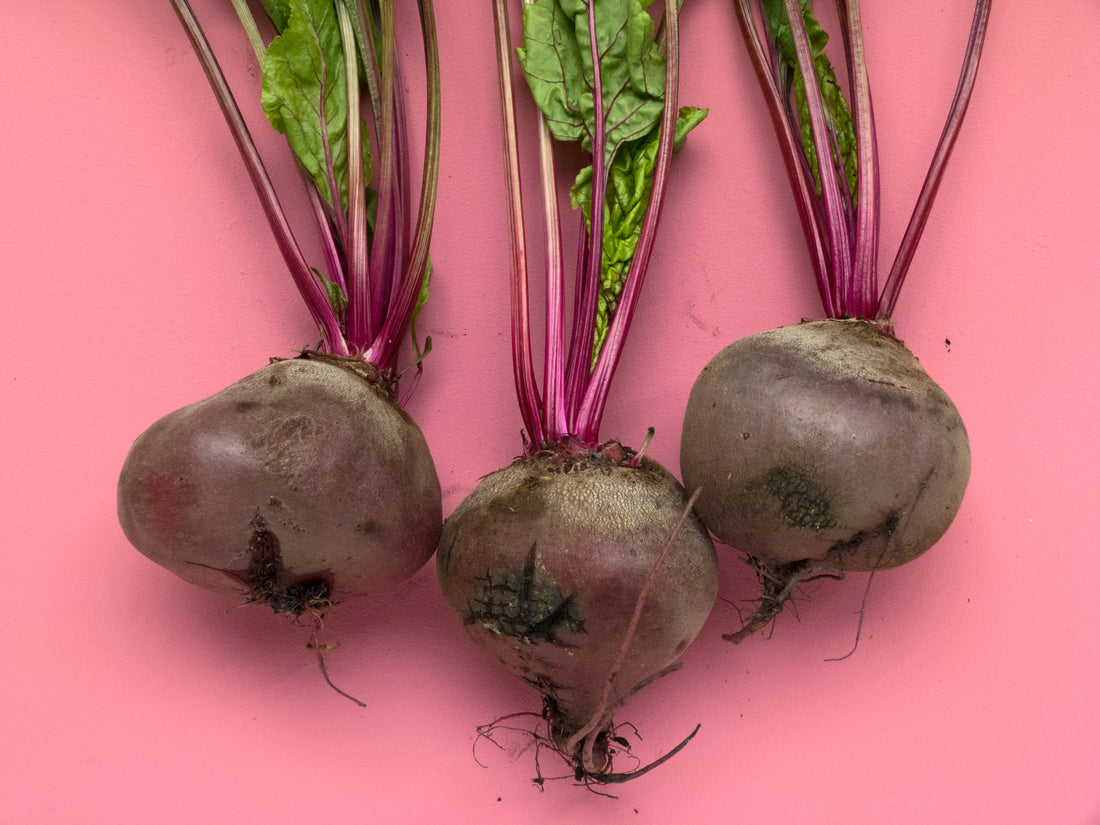
Share
Beet Root is literally a game changer––however scientists are showing its benefits extend far beyond the field!
I'm sure this isn't the first time you've heard about this potent blood red root. Beet has grown immensely in popularity these last few years. As more clinical trials and peer reviewed studies are being published, Beet Root benefits are finally backed by the scientific community.
It's no accident we decided to fuse this superfood with nutrient rich algae Sea Moss.
In this article, we're going to explore some of the most popular benefits and the science behind this superfood.
Beet Root Benefits
Beet Root benefits include increased athletic performance, improved cognitive function and cardiovascular health. In addition, Beet Root is one of the most antioxidant rich foods on the planet.
1. Exercise Performance
When Beet Root is ingested, it increases Nitric Oxide (NO) levels in the blood. NO serves multiple functions related to blood flow, gas exchange, mitochondrial biogenesis, and muscle contraction (Domínguez, 2017).
Fundamentally, Nitric Oxide helps to dilate blood vessels and support vascularity. This produces better circulation and higher oxygen levels throughout the body–resulting in superior athletic performance.
A 2018 study conducted by the International Society of Sports Nutrition indicated supplementation with beetroot juice has been shown to diminish the muscular fatigue associated with high-intensity exercise efforts, though it is not known if this is achieved by reducing fatigue and muscle damage and/or promoting muscle regeneration post-exercise.
Further more, the study showed that Beet Root improves the release and re-uptake of calcium at the sarcoplasmic reticulum. This could help the power production associated with movements in muscle shortening velocity (Domínguez, 2018).
2. Brain Health
Many studies show that exercise has positive neuroplastic effects on the brain, however new studies are examining the effects of supplementing Beet Root along with exercise on older adults.
The results are promising!
Consuming Beet Root before working out improves the cognitive function of older adults–mirroring that of a younger brain, according to a new study conducted by Wake Forest University.
"Older adults who exercised and consumed BRJ (Beet Root Juice) demonstrated greater consistency within the motor community and fewer secondary connections with the insular cortex compared with those who exercised without BRJ.
The exercise + BRJ group had brain networks that more closely resembled those of younger adults, showing the potential enhanced neuroplasticity conferred by combining exercise and BRJ consumption"(Petrie, 2017).
3. Healthy Blood Pressure Support
It's no secret high blood pressure is one of the leading causes of death in the United States–killing approximately half a million people every year.
Beet Root just might be one of most beneficial vegetables in your diet. Multiple studies have examined the effects of Beet Root on both healthy and hypertensive volunteers. The effects have been positive in both groups–recording sustained lower blood pressure and reduced arterial stiffness.
A study sponsored by the Queen Mary University of London completed their clinical study in December 2015, and concluded the following:
"Single dose administration of dietary inorganic nitrate (Beet Root) acutely reduces blood pressure (BP) in normotensive healthy volunteers, via bioconversion to the vasodilator nitric oxide.
We assessed whether dietary nitrate might provide sustained BP lowering in patients with hypertension.
We randomly assigned 68 patients with hypertension in a double-blind, placebo-controlled clinical trial to receive daily dietary supplementation for 4 weeks with either dietary nitrate (250 mL daily, as beetroot juice) or a placebo (250 mL daily, as nitrate-free beetroot juice) after a 2-week run-in period and followed by a 2-week washout. We performed stratified randomization of drug-naive (n=34) and treated (n=34) patients with hypertension aged 18 to 85 years.
The primary end point was change in clinic, ambulatory, and home BP compared with placebo. Daily supplementation with dietary nitrate was associated with reduction in BP measured by 3 different methods.
Mean (95% confidence interval) reduction in clinic BP was 7.7/2.4 mm Hg (3.6–11.8/0.0–4.9, P<0.001 and P=0.050). Twenty-four-hour ambulatory BP was reduced by 7.7/5.2 mm Hg (4.1–11.2/2.7–7.7, P<0.001 for both). Home BP was reduced by 8.1/3.8 mm Hg (3.8–12.4/0.7–6.9, P<0.001 and P<0.01) with no evidence of tachyphylaxis over the 4-week intervention period. Endothelial function improved by ≈20% (P<0.001), and arterial stiffness was reduced by 0.59 m/s (0.24–0.93; P<0.01) after dietary nitrate consumption with no change after placebo. The intervention was well tolerated. This is the first evidence of durable BP reduction with dietary nitrate supplementation in a relevant patient group" (Kapil, 2015).
4. Antioxidant Rich
So far, the above benefits are all linked to Beet Root's Nitric Oxide content. However, there's more to this blood red vegetable.
Beet Root is a concentrated source of phytochemical compounds that include phenolic and ascorbic acid, carotenoids, flavonoids and betalains.
"Members of the betalain family are categorized as either betacyanin pigments that are red-violet in color or betaxanthin pigments that are yellow-orange in color.
A number of investigations have reported betalains to have high antioxidant and anti-inflammatory capabilities in vitro and a variety of in vivo models. This has sparked interest in a possible role for Beet Root in clinical pathologies characterized by oxidative stress and chronic inflammation such as liver disease and arthritis" (Clifford, 2015).
Though we've only covered four benefits of Beet Root, it has so much more to offer. As time permits, we'll drop a few more articles on this amazing superfood. If you'd like to share your experience with this vegetable, or ask a few questions, please leave them in the comments below. I'll do my best to respond!
Also, stay tuned to our blog as I'll write more about emerging superfoods, and like always...back it up by science! 🙂
If you'd like to try out our brand new Sea Moss with Beet Root Capsules, please click here or the picture below!
References
Domínguez, R., Maté-Muñoz, J.L., Cuenca, E. et al. Effects of beetroot juice supplementation on intermittent high-intensity exercise efforts. J Int Soc Sports Nutr 15, 2 (2018). https://doi.org/10.1186/s12970-017-0204-9
Domínguez R, Cuenca E, Maté-Muñoz JL, et al. Effects of Beetroot Juice Supplementation on Cardiorespiratory Endurance in Athletes. A Systematic Review. Nutrients. 2017;9(1):43. Published 2017 Jan 6. https://doi:10.3390/nu9010043
Meredith Petrie, W. Jack Rejeski, Swati Basu, Paul J Laurienti, Anthony P Marsh, James L Norris, Daniel B Kim-Shapiro, Jonathan H Burdette, Beet Root Juice: An Ergogenic Aid for Exercise and the Aging Brain, The Journals of Gerontology: Series A, Volume 72, Issue 9, September 2017, Pages 1284–1289, https://doi.org/10.1093/gerona/glw219
Kapil V, Khambata RS, Robertson A, Caulfield MJ, Ahluwalia A. Dietary nitrate provides sustained blood pressure lowering in hypertensive patients: a randomized, phase 2, double-blind, placebo-controlled study. Hypertension. 2015;65(2):320‐327. https://www.ahajournals.org/doi/10.1161/HYPERTENSIONAHA.119.14219
Clifford T, Howatson G, West DJ, Stevenson EJ. The potential benefits of red beetroot supplementation in health and disease. Nutrients. 2015;7(4):2801‐2822. Published 2015 Apr 14. https://www.ncbi.nlm.nih.gov/pmc/articles/PMC4425174/


3 comments
How much iodine is in each capsule or what is the milligram of the iodine just curious
THANKS
Ilove Herbs and mother nature and I am interested in your post